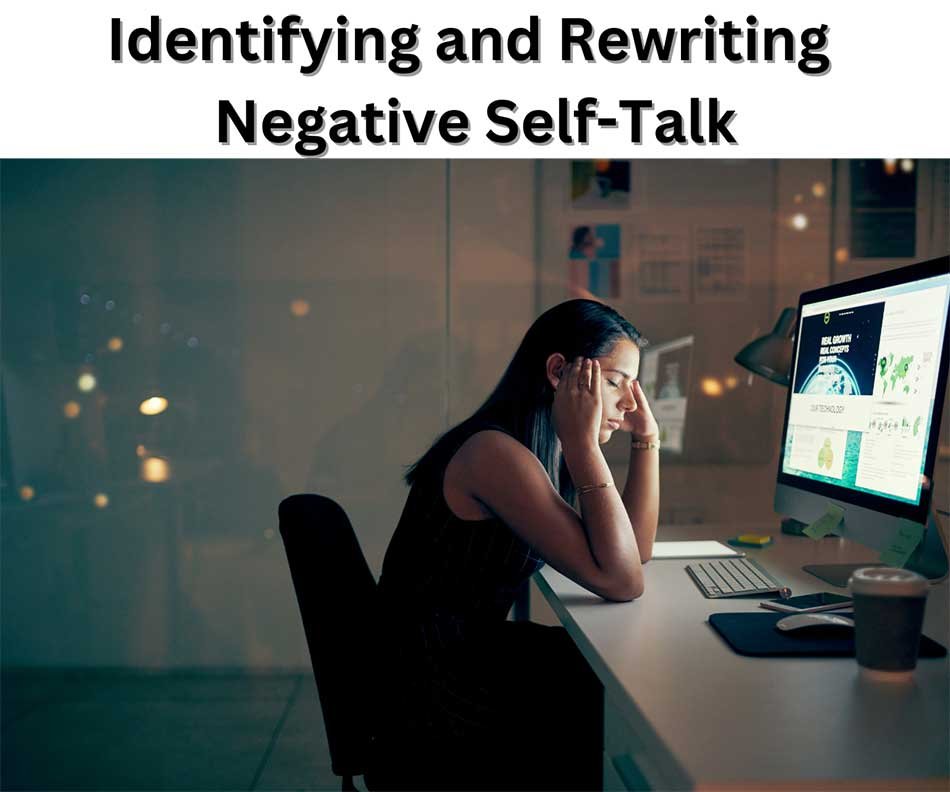
Identifying and Rewriting Negative Self-Talk: Transforming Your Inner Dialogue
Our minds are constant conversationalists. From the moment we wake up until we fall asleep, a continuous stream of thoughts, judgments, and observations runs through our heads. This inner voice, often referred to as self-talk, can be our greatest cheerleader or our harshest critic. For many, it unfortunately leans towards the latter, whispering doubts, highlighting flaws, and undermining confidence. This negative self-talk isn’t just annoying; it directly impacts our mood, motivation, decision-making, and overall potential, subtly shaping our reality.

The insidious nature of negative self-talk is that it often feels like an undeniable truth, especially when it’s been a lifelong companion. We accept “I’m not good enough” or “I always mess things up” as facts, rather than recognizing them as mere thoughts – thoughts that can be challenged and ultimately rewritten. Understanding what is a mindset shift: a beginner’s guide is crucial, as rewriting your self-talk is one of the most fundamental shifts you can make.
This article will delve into how to identify your negative self-talk patterns, explain why they occur, and provide actionable strategies for systematically rewriting these limiting narratives into empowering beliefs, transforming your inner dialogue and unlocking your true capabilities.
The Silent Saboteur: Why Negative Self-Talk Harms Us
Negative self-talk, left unchecked, can wreak havoc on our well-being and progress:
- Erodes Confidence: Constant criticism chips away at self-esteem and self-worth.
- Fuels Anxiety & Depression: Repetitive negative thoughts can create and perpetuate cycles of anxiety, stress, and sadness.
- Leads to Procrastination & Inaction: If your inner voice says “You’ll fail,” why even try? This can stall progress on everything, including building a home-based business opportunities.
- Impairs Performance: Self-doubt can hinder focus and lead to mistakes, becoming a self-fulfilling prophecy. Your ability to maintain what focus really means and what kills it daily is directly impacted.
- Strains Relationships: A negative internal state can spill over into how you interact with others, leading to irritability or withdrawal.
- Limits Potential: By constantly telling yourself what you can’t do, you prevent yourself from even exploring possibilities.
The good news? This inner critic isn’t you; it’s a part of you that can be retrained.
Identifying Negative Self-Talk: Bringing It into the Light
You can’t rewrite what you don’t recognize. Becoming aware of your negative self-talk is the first, crucial step.
1. Listen Actively to Your Inner Voice
Pay attention to what you say to yourself throughout the day.
- The Strategy: Set a mental reminder to “check in” with your thoughts several times a day, especially when you feel stress, frustration, or inadequacy. What phrases repeat in your mind? What judgments do you make about yourself?
- Warning Signs: Look out for absolute statements (“always,” “never,” “every time”), self-blame, catastrophizing (“this will be a disaster”), and personalizing (“it’s all my fault”).
- Real-Life Example: Sarah noticed that whenever she made a small mistake at work, her inner voice would immediately jump to, “You’re so stupid; you always mess things up.” This consistent pattern helped her identify a key piece of negative self-talk.
2. Journal Your Thoughts (The Thought Dump)
Writing thoughts down can make them more tangible and easier to analyze.
- The Strategy: When you feel overwhelmed or stuck in a negative thought loop, grab a pen and paper (or a digital document) and just write down everything that comes to mind, without judgment or censorship. Don’t worry about grammar or flow.
- Why it Works: It externalizes the thoughts, creating distance and allowing you to see patterns you might not notice otherwise. It’s a key step in retraining your thought patterns, similar to the process described in how I replaced negative thoughts with empowering beliefs.
- Real-Life Example: Mark felt a constant, vague anxiety. He started a daily “thought dump” journal. After a few days, he noticed a recurring theme: “I’m not good enough to handle this.” Pinpointing this specific thought made it actionable.
3. Identify Your Triggers
Negative self-talk often appears in specific situations.
- The Strategy: When negative self-talk arises, note what just happened. Was it a criticism? A deadline? Social interaction? A perceived failure? Recognizing triggers helps you prepare and intervene proactively.
- Real-Life Example: Emily realized her negative self-talk (“I’m not cut out for this”) flared up every time she looked at her financial statements. This told her that financial review was a trigger for self-doubt.
Rewriting Negative Self-Talk: Practical Strategies for Transformation
Once identified, negative self-talk isn’t about ignoring it or pretending it doesn’t exist. It’s about consciously challenging it and replacing it with more supportive, realistic thoughts.
1. Challenge the Thought: Is It True?
Put your negative self-talk on trial.
- The Strategy: Ask yourself:
- Is this thought 100% true? Always?
- What evidence do I have to support this thought?
- What evidence do I have that contradicts this thought? (Even small examples count!)
- Would I say this to a friend? If not, why say it to myself?
- Real-Life Example: When Liam thought, “I always mess up presentations,” he’d recall every time he didn’t mess up, even small successful interactions. He’d list specific positive feedback he’d received. This objective evidence weakened the “always.”
2. Reframe the Thought: Find a Kinder, More Realistic Perspective
Change the lens through which you view the situation.
- The Strategy: Instead of focusing on what went wrong, reframe it.
- From “I failed” to “I learned.”
- From “This is too hard” to “This is a challenge I can grow from.”
- From “I’m inadequate” to “I’m making progress.”
- Real-Life Example: Instead of “I blew that interview,” David reframed it to: “That interview was practice. I learned what questions to prepare for next time.” This more constructive perspective allowed him to maintain motivation.
3. Replace with Empowering Affirmations
Consciously feed your mind positive, supportive statements.
- The Strategy: Create specific, positive statements that directly counteract your negative self-talk. Repeat them regularly, especially in the morning or when a negative thought arises. For example, if your negative self-talk is “I’m not good enough,” your affirmation could be “I am capable and worthy.” For examples of empowering self-talk, review morning affirmations for confidence and focus or a general overview of what are affirmations and do they really work.
- Real-Life Example: Brenda used to tell herself, “I’m not creative.” She started replacing it with, “I am creative, and my ideas have value.” She repeated it while making art, and gradually, she started to believe it and produce more creative work.
4. Practice Self-Compassion
Treat yourself with the same kindness and understanding you would offer a friend.
- The Strategy: When you hear negative self-talk, acknowledge that you’re struggling, and offer yourself comfort. Instead of judging the thought, offer yourself warmth and support.
- Real-Life Example: When Chloe felt her inner critic saying, “You’re so lazy for taking a break,” she’d respond, “It’s okay. I need rest to be productive. Taking care of myself is important.”
5. Focus on Action, Not Just Thought
Behavior can influence belief.
- The Strategy: Take small, consistent actions that contradict your negative self-talk. Even tiny steps build evidence against the limiting belief.
- Real-Life Example: If Liam believed, “I’ll never finish this project,” he’d commit to just 15 minutes of work. Completing that small chunk provided tangible proof that he could make progress, overriding the negative thought with action.
The Path to a More Empowered You
Identifying and rewriting negative self-talk is a continuous practice, not a one-time fix. These patterns have often been ingrained for years. There will be days when the old narrative tries to creep back in. The key is consistent awareness, gentle redirection, and a steadfast commitment to treating yourself with kindness and respect.
By diligently transforming your inner dialogue, you free up immense mental and emotional energy, boost your confidence, and remove the invisible barriers that have been holding you back. You unlock your true potential, not because you changed who you are, but because you finally started believing in it.
20 Empowering Quotes on Self-Talk and Inner Power:
- “The mind is everything. What you think you become.” – Mahatma Gandhi
- “Change your thoughts and you change your world.” – Norman Vincent Peale
- “Whether you think you can, or you think you can’t – you’re right.” – Henry Ford
- “Argue for your limitations, and sure enough, they’re yours.” – Richard Bach
- “You are capable of more than you know.” – Glinda the Good Witch (from The Wizard of Oz)
- “The greatest discovery of all time is that a person can change his future by merely changing his attitude.” – Oprah Winfrey
- “Don’t let the noise of others’ opinions drown out your own inner voice.” – Steve Jobs (Applies to internal voice too).
- “Doubt kills more dreams than failure ever will.” – Suzy Kassem
- “Your value doesn’t decrease based on someone’s inability to see your worth.” – Unknown
- “The only person you are destined to become is the person you decide to be.” – Ralph Waldo Emerson
- “Our deepest fear is not that we are inadequate. Our deepest fear is that we are powerful beyond measure.” – Marianne Williamson
- “What you focus on expands.” – Esther Hicks
- “The past has no power over the present moment.” – Eckhart Tolle
- “To be yourself in a world that is constantly trying to make you something else is the greatest accomplishment.” – Ralph Waldo Emerson
- “It’s never too late to be what you might have been.” – George Eliot
- “All that we are is the result of what we have thought.” – Buddha
- “The greatest glory in living lies not in never falling, but in rising every time we fall.” – Nelson Mandela (Applies to thought patterns).
- “Your beliefs become your thoughts, your thoughts become your words, your words become your actions, your actions become your habits, your habits become your values, your values become your destiny.” – Mahatma Gandhi
- “The art of being happy lies in the power of extracting happiness from common things.” – Henry Ward Beecher (Including positive self-talk).
- “You are not your thoughts. You are the observer of your thoughts.” – Unknown
Picture This
Imagine your inner self-talk as a constant radio station playing in your head. For years, it’s been stuck on a station broadcasting only negative news, criticism, and self-doubt. You’ve simply accepted it as the only available channel. Identifying negative self-talk is like realizing you have a remote control. Rewriting it is like actively changing the station. You experiment with different frequencies, searching for channels broadcasting encouragement, self-belief, and constructive feedback. It takes conscious effort to find the new channels and keep them tuned, but gradually, the background noise shifts from a draining static to an empowering symphony, transforming the entire soundtrack of your life.
Share This Article
Did this article help you learn how to identify and rewrite negative self-talk? Share it with friends, family, or on social media to help others transform their inner dialogue and unlock their true potential!
Disclaimer
This article is intended for informational purposes only and provides general guidance on managing negative self-talk. Individual experiences and the effectiveness of strategies may vary. Negative self-talk can sometimes be a symptom of underlying mental health conditions. It is not a substitute for professional advice, diagnosis, or treatment for specific psychological challenges, anxiety, depression, or other mental health concerns. If you are experiencing significant or persistent difficulties, please consult with a qualified mental health professional.






